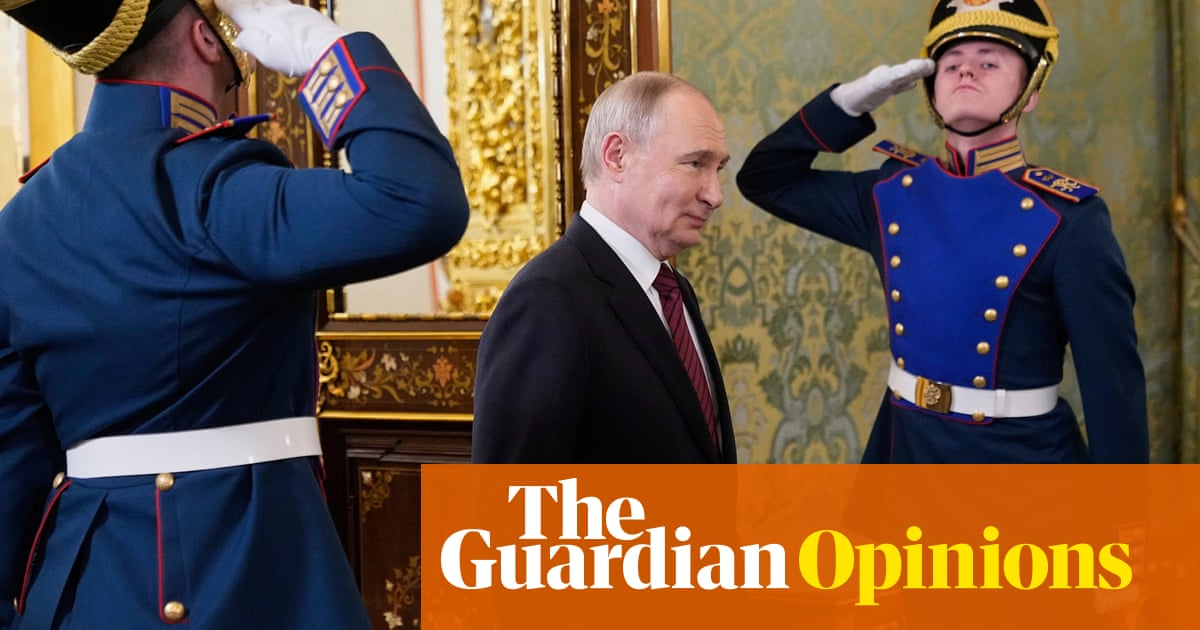It’s tempting to hope the establishmentlast weekof a Special Tribunal for the Crime of Aggression against Ukraine, to give its full name, will lead to the speedy trial and indefinite incarceration of Vladimir Putin and senior Russian leaders. After all, the new court isbacked by about 40 countries, including the UK, plus the EU and Council of Europe. And only fools like Donald Trump are confused aboutwho the aggressor isin this conflict.
Sadly, this appealing notion has scant basis in reality. Ducking peace talks and dodging responsibility for the war he started, a smirking Putin manspreads smugly in the safety of the Kremlin. He also hides behind the outdated convention that serving heads of state enjoylegal immunity. The bottom line is unchanging: Russia will ignore the new tribunal, just as it ignoresarrest warrants for Putinover alleged war crimes brought by the international criminal court (ICC).
This lawless state of affairs is intolerable. So why is it tolerated? While the Ukraine tribunal sets no time limit on punishing aggression, other factors help Putin to evade justice. One is that autocratic allies like China’sXi Jinping, rightwing extremists like Israel’s Benjamin Netanyahu and powerful states like the US also reject international jurisdiction, fearing it may constrain or ensnare them. Netanyahu is another unrepentantICC indicteewho, like Putin, remains at large.
International law – comprising UN-endorsed rules, treaties, conventions and standards – is the foundation stone of the post-1945 global order. It assumes ever greater importance as the world grows more disordered. Yet everywhere, or so it seems, its principles, tenets, institutions and practitioners are challenged,flouted and underminedby politicians and governments whose duty is to uphold it. Whatever consensus previously existed is collapsing.
The days when nations could sit down together and agree the Universal Declaration of Human Rights, as in 1948, are over. Even then, the declaration wasn’t truly universal, in that only a minority of the world’s countries – 48 UN member states – backed it.Now a majorityblatantly ignores it.
Special tribunals havesuccessfully prosecuted war crimes in 1945 – theNuremberg trialsof Nazi leaders – and in the former Yugoslavia and Rwanda. But it is a typicallyconvoluted, costly and slow-movingprocess. Tribunals suffer similar problems to the ICC and the international court of justice (ICJ) in The Hague (the UN “world court”) – namely, fracturing support among influential states led by authoritarian, anti-democratic figures.
Such explanations and excuses are no comfort to bombed and starving residents of Gaza, who, according to the UN’s aid chief, Tom Fletcher, face anincipient genocide. He urged the UN security council to intervene immediately. The “corrosive and infectious” degradation of international humanitarian law in Gaza was undermining decades of progress on civilian protection, Fletcher said. “Humanity, the law, and reason must prevail.”
Fewbeyond Israelwill doubt the justice of his plea. But the unreformed security council, guardian of the UN charter and the Geneva conventions governing the “laws of war”, ischronically dividedon this and other major global issues. Its ineffectiveness exacerbates the crisis in international law enforcement. It’s pointless seeking justice there.
Similarly,South Africa’s genocide case against Israelat the ICJ is groundbreaking – but may take years to be resolved, if it ever is. ICC investigations have not, and will not, save desperate people in Myanmar, Afghanistan or Sudan from prolonged additional suffering. Welcome though it is, the Ukraine tribunal risks becoming a fig leaf for the collective failure to swiftly halt an indisputably illegal war.
Legal redress may be sought in other ways, through so-calledhybrid courts(as in Sierra Leone and Cambodia), or via national courts that assume “universal jurisdiction”. French and German courts, for example, have prosecuted former Syrian regime torturers, on the principle that such crimes harm the international order. This approach is underpinned by the UN’s 2005 “responsibility to protect” doctrine, which requires states to act to prevent mass atrocity crimes. Trouble is, most states neglect most such responsibilities most of the time.
Worse still, as Amnesty International’sannual report, published last month, notes, some governments “actively undermine” the quest for international justice. Trump, a serial lawbreaker and convicted felon, has pilloried the ICC andsanctioned its officials. Hungaryhosted Netanyahuin April when, in all honour, it should have arrested him. Countries in the global south felt it necessary to create theHague Groupthis year to protect the ICJ and ICC against arbitrary assaults on their authority.
Defiance of international law grows fiercer as demands to observe it intensify. Dictators and authoritarian regimes rarely stick to the rules. Yet democratic states such as Britain and the US, which should set an example, often do the opposite – most notoriously with the precedent-setting, illegal 2003 invasion of Iraq.
The UK isarguing in courtthat supplying Israel with components for combat jets used in Gaza is acceptable because, it claims, there’s no proof that genocide is occurring there. Such shameless sophistry ignores Britain’s unambiguous legal obligation, under thegenocide convention, to prevent and pre-empt genocide – not hang about until it has already happened.
It’s not all downhill. Significant victories have been won. Putin and Netanyahu were indicted. Public awareness of war crimes and crimes against humanity is rising. Other transgressors face a reckoning, sooner or later. PerhapsUkrainereally will obtain justice. For this epic struggle is raging everywhere, reflecting contested, transformational shifts in the global order and balance of power.
Put simply, it’s a struggle to do what’s right. At its heart lies not criminal wrongdoing but huge moral confusion among political leaders, their generals and followers. Without respect for law, human societies, however configured, cannot succeed. Peaceful coexistence ceases. All values, all security are lost. What’s left is the law of the jungle.
Simon Tisdall is a Guardian foreign affairs commentator
